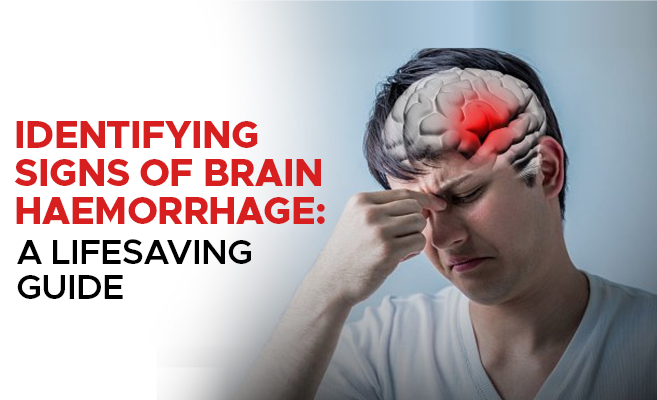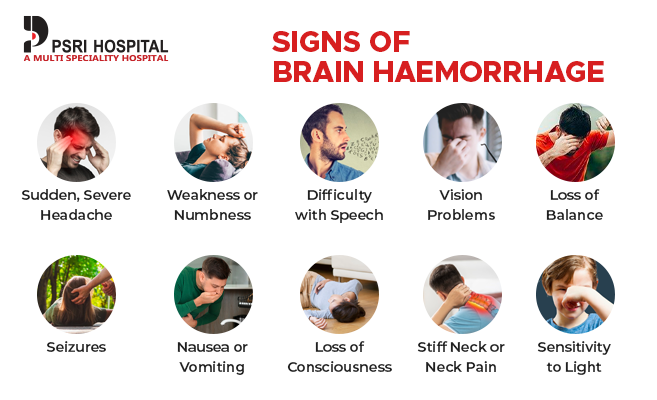Identifying Signs of Brain Haemorrhage: A Lifesaving Guide

The brain is a marvel of the human body, which controls every thought, movement, and emotion. Its proper functioning is essential to our overall well-being. However, certain medical conditions, like a brain haemorrhage, can create severe threats to this critical organ. So, understanding and recognising the signs of brain haemorrhage can be lifesaving. This blog aims to enlighten you about this serious condition and its warning signs. So, let’s start.
What is Brain haemorrhage?
Brain haemorrhage, also known as cerebral or intracranial haemorrhage, is a type of stroke caused by an artery bursting in the brain, leading to localised bleeding. This bleeding can damage brain cells and, if not treated properly, can have severe or even life-threatening consequences. Knowing the signs of brain haemorrhage is crucial for quick and effective treatment.

Signs of Brain Haemorrhage
Recognising the signs of brain haemorrhage is crucial for seeking timely medical intervention. Here’s a more detailed look at these symptoms:
Sudden, Severe Headache: Often described as a ‘thunderclap’ headache, this intense pain strikes suddenly and without warning. Unlike regular headaches, it peaks in severity almost instantly.
Weakness or Numbness: You might notice an abrupt weakness or a numbing sensation, typically on one side of the body. It could be in an arm, a leg, or even on one side of the face.
Difficulty with Speech: Sudden trouble in forming coherent speech or understanding what others are saying can occur. Words may be slurred or completely incoherent.
Vision Problems: This includes a sudden loss of vision, blurred vision, or double vision. These vision changes might affect one or both eyes.
Loss of Balance: Experiencing unexplained dizziness, trouble walking, or a sudden loss of balance signifies a possible brain tumor.
Seizures: Seizures, especially if they are new and without a previous history of epilepsy, are a critical symptom. They might be full-body or localised in one part of the body.
Nausea or Vomiting: This symptom, mainly when it accompanies a severe headache or other signs, is a warning indicator.
Loss of Consciousness: Fainting or blacking out, even briefly, should be taken seriously, especially if it follows other symptoms like a headache or nausea.
Stiff Neck or Neck Pain: A sudden, severe neck pain or a stiff neck without any apparent cause can be associated with a brain haemorrhage.
Sensitivity to Light: A sudden intolerance to light, where it becomes painful or uncomfortable to look at bright lights, can also be a symptom.
Confusion or Altered Mental State: Sudden confusion, disorientation, or a drastic change in mental state, including extreme agitation, can be causes of a brain haemorrhage.
Sudden Fatigue: Feeling overwhelmingly tired or fatigued without a clear reason, especially when accompanied by other symptoms, could indicate a haemorrhage.
When to Seek Immediate Medical Attention
Recognising when to see a doctor immediately can be the difference between a full recovery and severe complications when it comes to a brain haemorrhage. Here are specific situations that warrant urgent medical care:
Sudden Onset of Symptoms: If you or someone else experiences any of the signs of a brain haemorrhage, such as a sudden severe headache, weakness, or vision problems, it’s imperative to seek medical help right away.
Worsening of Existing Symptoms: If you are already experiencing mild symptoms that begin to worsen rapidly, this clearly indicates that immediate medical attention is needed.
Multiple Symptoms Occurring Together: The simultaneous occurrence of several symptoms of brain haemorrhage is a critical sign. For instance, if a severe headache is accompanied by nausea, vomiting, or confusion, it’s time to go to the hospital.
Change in Consciousness: Any alteration in consciousness, such as fainting, blacking out, or experiencing a significant drop in alertness, should be treated as a medical emergency.
Conclusion
Recognising the signs of brain haemorrhage is the first step in getting timely and effective treatment. PSRI International Hospital is a best hospital in India for international patients that understand the critical nature of this condition. As the best hospital for brain tumor surgery in Delhi and a best hospital in India for Ghana patients, we are equipped with advanced technology and a team of expert neurologists and surgeons. Our commitment to providing high-quality, compassionate care makes us a trusted choice for patients around the globe. If you or your loved ones are experiencing any signs of a brain haemorrhage, PSRI International Hospital is here to offer exceptional medical care, ensuring the best possible outcomes.
FAQs
What Is the Most Common Cause of a Brain Haemorrhage?
Ans. The most common causes of brain haemorrhage include high blood pressure (chronic hypertension), which can weaken arterial walls over time, and aneurysms, which are weak spots in blood vessel walls that can burst. Head injuries are also a significant cause, especially in younger people.
Can Lifestyle Changes Help Prevent Brain Haemorrhage?
Ans. Yes, lifestyle changes can reduce the risk. Maintaining healthy blood pressure through diet, exercise, and medication, avoiding excessive alcohol consumption, and not smoking can significantly lower the risk of a brain haemorrhage.
Is a Brain Haemorrhage Always Life-threatening?
Ans. Not always. The severity and outcome of a brain haemorrhage depend on the location, amount of bleeding, and how quickly treatment is provided. While it is a serious condition, prompt medical intervention can lead to recovery.
What Are the Long-Term Effects of a Brain Haemorrhage?
Ans. Long-term effects vary depending on the haemorrhage’s severity and location. They can range from mild, such as headaches, to more serious, such as cognitive or physical impairments. Rehabilitation therapy is crucial in recovery and can help regain lost functions.
How Quickly Do You Need a Treatment After Identifying the Signs of a Brain Haemorrhage?
Ans. Immediate medical attention is crucial. Brain haemorrhage is a life-threatening emergency, and the sooner treatment is started, the better the chances of minimising brain damage and improving the outcome. If you or someone else exhibits symptoms of a brain haemorrhage, seek emergency medical care right away.

 Book An Appointment
Book An Appointment Virtual Consultation
Virtual Consultation





